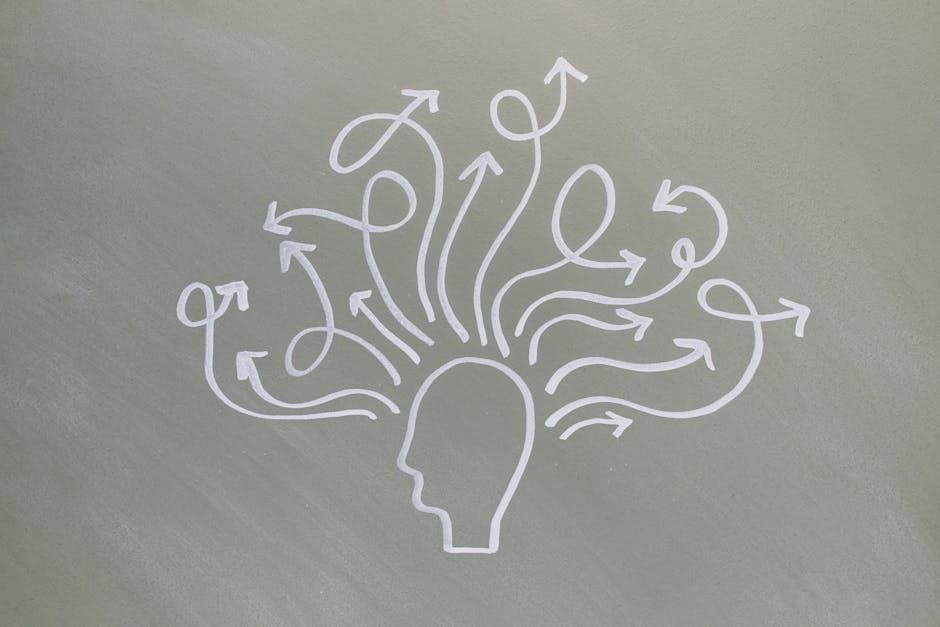David Myers’ Psychology textbook is a comprehensive resource, offering an engaging narrative that blends scientific research with real-world applications, making complex concepts accessible for students.
Overview of the Textbook
Myers’ Psychology textbook provides a comprehensive exploration of psychological principles, blending research, theory, and practical applications. It covers core topics like cognition, emotion, and behavior, while incorporating real-world examples to enhance understanding. The textbook is known for its clear, engaging narrative and robust learning tools, such as concept maps and self-testing features. Designed for both students and educators, it offers a balanced approach to the field of psychology, making it a trusted resource for academic success. Its availability in PDF format ensures accessibility, allowing learners to study efficiently and effectively. The text is widely praised for its clarity and depth.
Importance of Psychology in Education
Psychology plays a vital role in education by providing insights into how students learn, think, and behave. Myers’ textbook emphasizes the application of psychological principles to enhance educational practices, such as understanding cognitive development, motivation, and classroom dynamics. By exploring how students process information and retain knowledge, educators can design more effective teaching strategies. Psychology also helps address individual differences, learning disabilities, and emotional challenges, fostering a supportive learning environment. Its principles guide the development of curriculum, assessment methods, and instructional tools, ensuring education is tailored to meet diverse student needs. This integration of psychology into education promotes academic success and personal growth for learners at all levels.
Structure and Content of the Textbook
Myers’ Psychology textbook is structured to provide a clear and logical progression through the field of psychology. It begins with foundational topics like research methods and biological processes, progressing to complex areas such as cognition, motivation, and developmental psychology. Each chapter is designed to build upon previous knowledge, ensuring a comprehensive understanding. The textbook includes detailed explanations, real-world examples, and engaging visuals to enhance learning. Additionally, it offers study guides, online resources, and supplementary materials to support student success. The content is organized to be accessible, with clear language and practical applications, making it an invaluable resource for psychology students.

Author Background
David G. Myers is a renowned psychology author and professor, known for his engaging narrative style and contributions to education. His work emphasizes real-world applications of psychological principles, making complex concepts accessible to students and enhancing their understanding of human behavior.
David G. Myers: Biography and Contributions
David G. Myers is a distinguished psychology professor and author, known for his contributions to education and community service. His academic career spans multiple institutions, and he has written 17 books, including The Pursuit of Happiness and Intuition: Its Powers and Perils. Myers has chaired his city’s Human Relations Commission and co-founded a family assistance center. His research and writings have been recognized with the Gordon Allport Prize, and his work has been cited over 2,000 times. Myers’ commitment to education and community reflects his dedication to applying psychological principles to real-world challenges.
Myers’ Approach to Psychology
David Myers’ approach to psychology emphasizes a narrative style that blends scientific research with real-world applications, fostering critical thinking and curiosity. His teaching philosophy integrates cultural diversity and evidence-based findings, ensuring a comprehensive understanding of psychological principles. Myers encourages active learning by incorporating case studies and relatable examples, making complex concepts accessible. His method promotes a deeper appreciation of psychology’s role in everyday life, equipping students with practical insights and analytical skills. This approach has made his textbooks widely respected and effective tools for psychology education.
Recognition and Awards
David Myers’ contributions to psychology have earned him numerous accolades, including the Gordon Allport Prize for his work on group polarization. His textbooks are widely acclaimed, with translations into multiple languages, reflecting their global impact. Myers has also received an honorary doctorate for his efforts in advancing psychology education. His ability to make complex concepts accessible has made his works indispensable in academic settings. These recognitions underscore his influence in shaping modern psychology education and research.
Editions of Myers Psychology Textbook
Myers’ Psychology textbook has evolved through multiple editions, each incorporating the latest research and teaching methods, ensuring it remains a leading resource for psychology education.
Evolution of the Textbook Over Time
David Myers’ Psychology textbook has undergone significant updates since its first publication, reflecting advancements in psychological research and educational methodologies. Each edition incorporates new findings, enhanced visuals, and improved pedagogical tools to meet the needs of modern students and instructors. The digital versions, including the PDF format, offer accessibility and convenience, ensuring the textbook remains a trusted resource for understanding psychology’s core concepts and applications.
Key Features of the Latest Edition
The latest edition of Myers’ Psychology textbook offers enhanced digital tools, updated research findings, and improved accessibility. It features interactive modules, video tutorials, and adaptive quizzes to engage students. The PDF version ensures portability and easy access across devices. New chapters address emerging topics in psychology, while revised content reflects current scientific understanding. The textbook also includes expanded study guides and multimedia resources, fostering a deeper comprehension of psychological concepts. These updates make the latest edition a versatile and comprehensive resource for both students and educators, catering to diverse learning styles and preferences.
Updates and Revisions in Recent Editions
Recent editions of Myers’ Psychology textbook have incorporated cutting-edge research and new perspectives in the field. Updates include expanded coverage of topics like cognitive psychology, neuroscience, and cultural psychology. Digital enhancements, such as interactive modules and video tutorials, have been added to improve student engagement. The PDF version now features improved navigation and accessibility options. Revisions also address feedback from educators and students, refining explanations of complex concepts for better clarity. These updates ensure the textbook remains a current and authoritative resource for understanding psychology, blending traditional theories with modern advancements in the discipline.

Core Concepts Covered
The textbook explores foundational topics such as introduction to psychology, research methods, biological basis of behavior, sensation and perception, and learning and memory, providing a solid understanding of psychological principles.
Myers’ Psychology textbook provides a compelling introduction to the field, blending scientific research with real-world applications. The chapter explores the scope of psychology, its history, and key theories, introducing students to the scientific study of behavior and mental processes. Myers emphasizes the interdisciplinary nature of psychology, connecting it to biology, neuroscience, and sociology. The text highlights how psychological principles apply to everyday life, making complex concepts accessible. By fostering critical thinking, the introduction prepares students to explore the full range of psychological topics, from cognitive processes to social interactions, offering a foundation for understanding human behavior and mental health.
Research Methods in Psychology
Myers’ Psychology textbook thoroughly explores research methods, emphasizing the scientific approach to understanding behavior and mental processes. The chapter covers experimental, correlational, and observational studies, highlighting the importance of ethical considerations. Students learn how to design experiments, collect data, and analyze results, while also understanding the limitations of research methods. Myers stresses the role of replication and peer review in ensuring the validity of psychological findings. The text also discusses the application of research methods in real-world settings, such as improving education, health, and social behaviors, making the content both informative and practical for future psychologists and researchers.
Biological Basis of Behavior
Myers’ Psychology textbook delves into the biological basis of behavior, exploring how the brain, nervous system, and genetics influence human actions and thoughts. The chapter explains the structure and function of neurons, neurotransmitters, and key brain regions, such as the cerebral cortex and limbic system. It also discusses the role of hormones and the endocrine system in regulating behavior. Myers emphasizes the interplay between nature (genetics) and nurture (environment) in shaping behavior, providing insights into biological contributions to learning, memory, and emotional processes. This section equips students with a foundational understanding of the biological underpinnings of psychology, essential for advanced study in the field.
Sensation and Perception
Myers’ Psychology textbook explores sensation and perception, detailing how we process sensory information and interpret stimuli. It explains the difference between sensation (the raw data of our senses) and perception (how the brain organizes and interprets this data). The chapter covers key concepts like absolute thresholds, just-noticeable differences, and sensory adaptation. Myers also discusses perceptual set and how expectations influence perception, as well as the brain’s tendency to organize stimuli into meaningful patterns. The text provides clear examples, such as optical illusions, to illustrate how perception can be influenced by context and cognition, offering a comprehensive understanding of this critical area of psychology.

Learning Resources
The Myers Psychology Textbook offers study guides and supplements to enhance learning. Interactive online resources, including practice quizzes and chapter summaries, provide comprehensive support for mastering key concepts and preparing for exams.
Study Guides and Supplements
The Myers Psychology Textbook is accompanied by a variety of study guides and supplements designed to enhance student learning. These resources include concept maps, self-test questions, and chapter summaries to help students master key concepts and terminology. Additionally, interactive online activities and practice quizzes are available, allowing students to apply their knowledge and track their progress. The supplements are tailored to support both visual and auditory learners, ensuring a comprehensive understanding of the material. By integrating these tools, students can deepen their engagement with the textbook content and achieve better academic outcomes. These resources are accessible online, making them convenient for anytime, anywhere study.
Online Resources for Students
The Myers Psychology Textbook offers a wealth of online resources designed to support student learning; These include interactive concept maps, self-quizzes, and video tutorials that complement the textbook content. Students can access flashcards and practice exams to test their understanding of key concepts. Additionally, the platform provides downloadable study guides and lecture slides for review. These resources are accessible through the textbook’s companion website, ensuring students can study anytime, anywhere. The online tools are tailored to accommodate different learning styles, helping students engage with the material more effectively and achieve academic success.

Accessing the Textbook in PDF Format
Accessing Myers’ Psychology Textbook in PDF format is convenient through official platforms. Ensure to use legal and university-approved sources to download the material, avoiding piracy.
Legal and Ethical Considerations
Accessing Myers’ Psychology Textbook in PDF format requires adherence to legal and ethical standards. Using unauthorized platforms to download copyrighted material violates intellectual property laws and undermines the efforts of authors and publishers. Always obtain the textbook through official publishers or academic institutions to ensure compliance with copyright regulations. Ethical considerations also emphasize the importance of supporting academic work by purchasing legitimate copies. Resorting to illegal downloads not only risks legal consequences but also deprives creators of fair compensation. Prioritize legal and ethical access to contribute to the sustainability of educational resources.
Platforms for Downloading Academic Materials
Several platforms offer access to academic materials like Myers’ Psychology Textbook in PDF format. Authorized platforms include Google Books, Amazon, and publisher websites, which provide legitimate previews or purchasing options. Additionally, Sci-Hub and Libgen are frequently mentioned for free access, though they operate outside copyright laws. Institutional libraries and academic databases like JSTOR or ProQuest also provide legal access to such materials. Always prioritize platforms that respect copyright to ensure ethical and legal access to educational resources. Using unauthorized platforms may violate laws and perpetuate piracy, harming authors and publishers.

Key Topics Explored
Myers’ Psychology Textbook covers essential topics such as learning and memory, motivation, emotion, and developmental psychology, providing a thorough understanding of human behavior and mental processes;
Learning and Memory
Myers’ Psychology Textbook delves into the intricacies of learning and memory, exploring how information is acquired, stored, and retrieved. It discusses various memory models, such as sensory, short-term, and long-term memory, and examines the biological and cognitive processes involved. The textbook highlights the role of sleep in memory consolidation, with research showing that adequate sleep enhances learning and retrieval. Practical applications, such as mnemonic devices and spaced repetition, are also covered to help students improve their own memory strategies. By integrating real-world examples and scientific findings, Myers provides a robust understanding of how humans learn and remember, making complex concepts accessible and engaging.
Motivation and Emotion
Myers’ Psychology Textbook explores the dynamic interplay between motivation and emotion, highlighting how these forces drive human behavior. It examines intrinsic and extrinsic motivators, such as personal goals and external rewards, and discusses theories like Maslow’s hierarchy of needs. The textbook also delves into emotional experiences, including primary emotions like fear and joy, and secondary emotions like guilt and pride. By integrating biological, cognitive, and cultural perspectives, Myers provides a holistic understanding of how emotions motivate actions and shape decision-making. Practical insights and real-world examples help students grasp the significance of these concepts in everyday life and personal growth.
Developmental Psychology
Myers’ Psychology Textbook dedicates a comprehensive section to developmental psychology, exploring human growth and development across the lifespan. It examines cognitive, social, and emotional development, from infancy through adulthood and aging. The textbook discusses key theories, such as Piaget’s stages of cognitive development and Erikson’s psychosocial stages, while emphasizing the role of nature, nurture, and culture. Practical examples and research findings illustrate how developmental processes shape behavior and identity. Myers’ engaging narrative helps students understand the dynamic interplay of biological, psychological, and environmental factors that influence human development at every stage of life, making complex concepts accessible and relatable.
Instructor Resources
Myers’ Psychology Textbook provides instructors with comprehensive teaching materials, including test banks, lecture slides, and online resources to enhance classroom engagement and facilitate effective instruction.
Teaching Materials and Tools
The Myers Psychology textbook offers instructors a wealth of teaching materials and tools to enhance their curriculum. These include test banks, lecture slides, and discussion guides, all designed to support diverse teaching methods. The resources are tailored to create an interactive learning environment, incorporating active learning strategies and technology integration. Instructors can access customizable content, such as PowerPoint presentations, to streamline lesson planning. Additionally, online tools provide opportunities for formative assessments and real-time student engagement. These materials not only simplify instruction but also help instructors assess student understanding effectively, fostering a dynamic and inclusive classroom experience.
Test Banks and Assessment Guides
The Myers Psychology textbook is accompanied by comprehensive test banks and assessment guides, providing instructors with a wide range of questions and tools to evaluate student understanding. These resources include multiple-choice questions, essay prompts, and scenario-based assessments, all aligned with the textbook’s content. The test banks are designed to cover key concepts and critical thinking skills, while the assessment guides offer detailed rubrics and scoring criteria. Instructors can use these tools to create quizzes, exams, and homework assignments, ensuring a fair and consistent evaluation process. Additionally, the resources help students track their progress and identify areas for improvement, fostering academic success.
Impact of Myers Psychology Textbook
Myers’ Psychology textbook has profoundly influenced psychology education, offering a clear, engaging approach that makes complex concepts accessible, while fostering critical thinking and a deeper understanding of human behavior.
Influence on Psychology Education
Influence on Psychology Education
Myers’ Psychology textbook has significantly shaped psychology education by providing a comprehensive, research-based narrative that engages students with real-world applications. Its clear, accessible writing style has made complex psychological concepts easier to understand, fostering a deeper appreciation for the field. The textbook’s integration of multicultural and diversity perspectives has broadened students’ understanding of human behavior. Additionally, its emphasis on critical thinking and scientific literacy has prepared students for further academic and professional pursuits. As a result, Myers’ work remains a cornerstone in psychology education, influencing generations of students and educators worldwide.
Student Feedback and Reviews
Students and educators consistently praise Myers’ Psychology textbook for its clarity, engaging narrative, and comprehensive coverage of key concepts. Many appreciate its ability to make complex topics accessible, with interactive tools and real-world examples enhancing learning. The textbook’s emphasis on critical thinking and scientific literacy has been particularly well-received. Positive reviews highlight its effectiveness in preparing students for exams and fostering a deeper understanding of psychology. With a 4.5-star rating on various platforms, Myers’ text is widely regarded as a trusted and valuable resource, making it a favorite among both students and instructors in the field of psychology.

Study Tips for Effectively Using the Textbook
Engage in active learning by summarizing chapters, testing yourself, and applying concepts to real-life scenarios. Use time management techniques to balance reading and review. Focus on key terms, concept maps, and online resources to enhance understanding and retention.
Active Learning Strategies
Active learning involves engaging deeply with material. Use flashcards to memorize key terms. Test yourself on concepts through quizzes and practice questions. Apply psychological principles to real-life situations to enhance understanding. Participate in study groups to discuss and debate topics. Teach concepts to others to reinforce learning. Utilize online resources like videos and interactives for a hands-on approach. Take detailed notes and review them regularly. Set specific goals for each study session to stay focused. Use concept maps to visually organize information. Reflect on what you’ve learned by summarizing chapters in your own words. These strategies promote long-term retention and critical thinking skills. Consistency and active engagement are key to mastering psychology concepts effectively.
Time Management for Psychology Students
Effective time management is crucial for psychology students to balance coursework, research, and personal life. Start by setting clear goals and prioritizing tasks using a planner or digital calendar. Allocate specific time blocks for studying, attending lectures, and reviewing Myers’ Psychology Textbook. Break down large chapters into smaller, manageable sections to avoid overwhelm. Use active learning techniques like summarizing key points after each session. Limit distractions by creating a dedicated study environment. Regularly review notes and engage in self-testing to reinforce retention. Balance academic responsibilities with relaxation to maintain productivity and mental well-being.
Myers’ Psychology Textbook remains a cornerstone in education, bridging theory and application. Its impact on understanding human behavior ensures its relevance for future generations of psychology learners and educators.
Final Thoughts on the Textbook
Myers’ Psychology Textbook is a seminal work, offering a rich, evidence-based exploration of psychology. Its clear, engaging style and comprehensive coverage make it an indispensable resource for students and educators alike. The textbook seamlessly integrates cutting-edge research with practical applications, fostering a deeper understanding of human behavior. Available in PDF format, it provides accessible learning materials for modern students. Myers’ ability to present complex concepts in an approachable manner has solidified the textbook’s reputation as a cornerstone of psychology education. It remains a vital tool for anyone seeking to explore the breadth and depth of psychological science.
Future of Psychology Education
The future of psychology education lies in integrating innovative technologies and adaptive learning tools, as seen in Myers’ textbook. Digital platforms and multimedia resources will enhance engagement, while AI-driven insights will personalize learning experiences. Virtual simulations and real-world applications will bridge theory and practice, preparing students for emerging challenges. Myers’ emphasis on critical thinking and scientific literacy will remain vital, fostering a future where psychology educators leverage data-driven approaches to address global mental health and societal issues, ensuring the discipline evolves with technological and cultural advancements.





